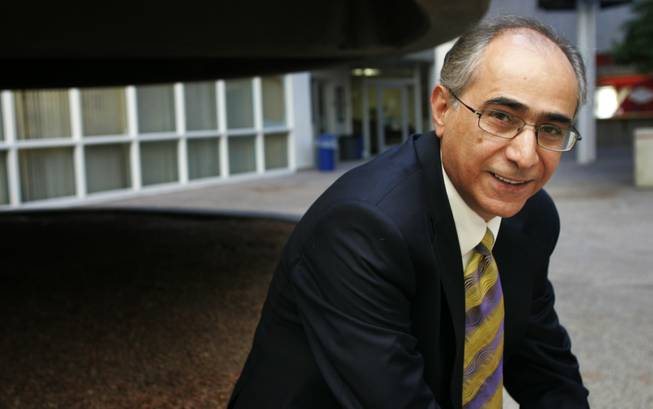
“The era of crazy price appreciation is over. I think the whole attitude of households in the United States has changed,” says Nasser Daneshvary.
Friday, Feb. 11, 2011 | 2 a.m.
Sun Topics
Nasser Daneshvary took a roundabout route to Las Vegas real estate expertise.
He left Iran more than 35 years ago to pursue a degree in economics in the United States with the intention of returning to teach there.
He had the financial support of the Iranian government, but lost it after the overthrow of the shah and formation of the Islamic Republic of Iran in 1979. Daneshvary stayed in the United States rather than face an uncertain future in his country.
Upon completing his studies at the University of Tennessee, Daneshvary taught economics in Vermont and Missouri. Then Keith Schwer, leader of the economics department at the time, invited Daneshvary to take a position at UNLV. Daneshvary soon became chairman of UNLV’s economics department and later associate dean of the College of Business.
He returned to teaching in 2005 and started conducting housing research two years later. He was named director of the Lied Institute for Real Estate Studies last summer.
You had a study on the toxic effects of foreclosures on neighborhoods. Will you explain it?
We know foreclosed homes sell for a discount, but what do they do to the neighborhood? We found out that the first few foreclosures have a big effect, and then five and six and seven don’t matter, and then eight, nine and 10 matter a lot. The negative effect on your value keeps declining until it reaches around 40 homes within a half a mile from you. You have lost 33 percent. More than that doesn’t matter.
Are you worried about foreclosures continuing?
Absolutely. More foreclosures mean home prices continue to drop. I have friends who bought a home for $700,000, and now it’s worth $300,000. They can afford it because they have jobs, but they keep looking at me and asking if I think they’re crazy if they pay on it for the next 20 years while the value is $300,000. If they don’t, that’s a strategic default. People are starting to do that. They see neighbors who gave up their homes through foreclosure and how they got rid of their debt and are rebuilding their lives. They are saying: “Why shouldn’t I do that?” That’s why I call it the toxic effect of foreclosures on neighbors.
Are banks turning to short sales?
There was good news until the end of November because short sales were increasing and foreclosure sales were declining. But December’s numbers showed foreclosures were higher. I think 2011 will be the year that short sales surpass foreclosures, but that’s optimistic. Everyone is talking about this shadow inventory of foreclosed homes with banks and lenders.
Where are home prices going?
I think the price has bottomed out. Maybe we lose 5 percent or we gain 5 percent next year. The decline is possible because of this shadow inventory of foreclosures. We will not see price recovery for at least three years. Even then, appreciation will happen in the 2 or 3 percent range.
Where will prices be in the next five to 10 years?
The era of crazy price appreciation is over. I think the whole attitude of households in the United States has changed. More and more people are accepting that having a house is not a quick investment. Having a house used to be called a long-term investment but even that’s gone. Having a house is a long-term savings.
What lessons should we learn from this?
We should be patient and not look for quick turnarounds on our returns — both investors and individuals. There were regular people buying three to four homes hoping in six months they could flip them for 20 percent profit. There’s nothing wrong with that if it’s sustainable, but it’s not sustainable.

Join the Discussion:
Check this out for a full explanation of our conversion to the LiveFyre commenting system and instructions on how to sign up for an account.
Full comments policy